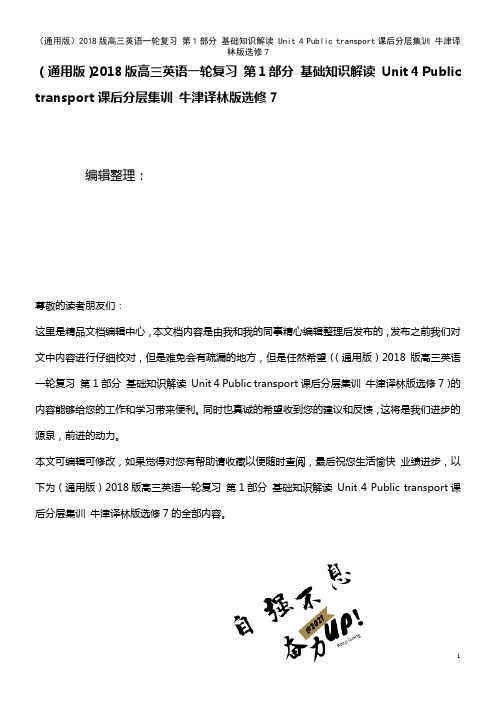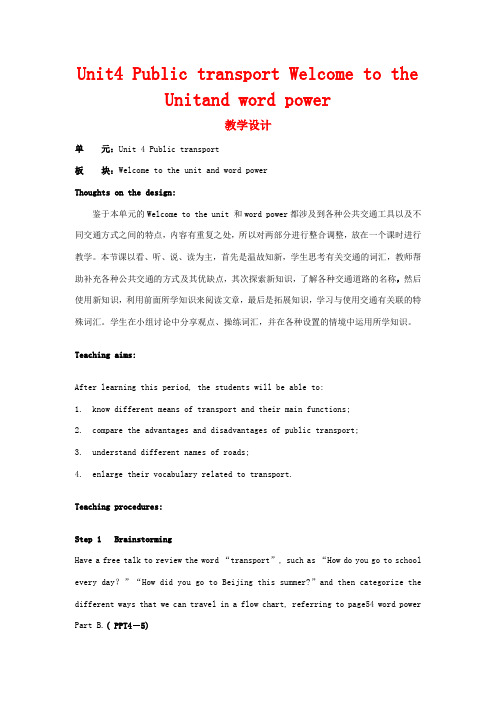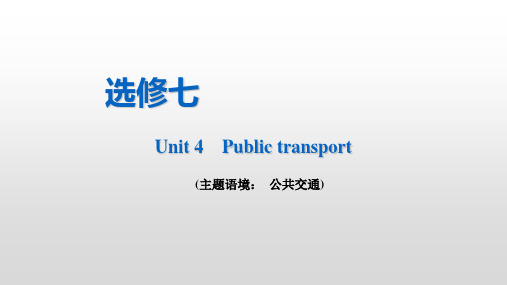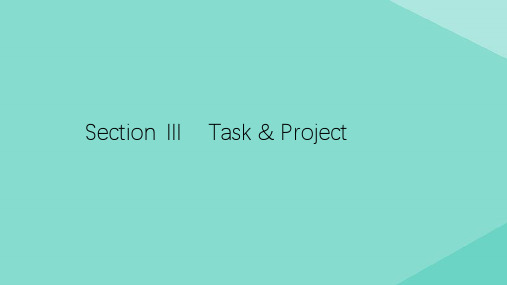高中英语Unit4PublictransportSectionⅢGrammar——短语动词教案(含解析)牛津译林版选修7
- 格式:doc
- 大小:152.50 KB
- 文档页数:6

(通用版)2018版高三英语一轮复习第1部分基础知识解读Unit 4 Public transport课后分层集训牛津译林版选修7编辑整理:尊敬的读者朋友们:这里是精品文档编辑中心,本文档内容是由我和我的同事精心编辑整理后发布的,发布之前我们对文中内容进行仔细校对,但是难免会有疏漏的地方,但是任然希望((通用版)2018版高三英语一轮复习第1部分基础知识解读Unit 4 Public transport课后分层集训牛津译林版选修7)的内容能够给您的工作和学习带来便利。
同时也真诚的希望收到您的建议和反馈,这将是我们进步的源泉,前进的动力。
本文可编辑可修改,如果觉得对您有帮助请收藏以便随时查阅,最后祝您生活愉快业绩进步,以下为(通用版)2018版高三英语一轮复习第1部分基础知识解读Unit 4 Public transport课后分层集训牛津译林版选修7的全部内容。
课后分层集训Unit 4 Public transportⅠ。
阅读理解(2017·东北三省四市教研联合体模拟)A survey has shown that what you do on a plane can be determined by which nationality is listed on your passport。
According to the results of an international passenger survey,Australians are the biggest drinkers on board with 36 percent choosing to down the hatch,compared to 35 percent of Americans and 33 percent of Brits。
The Airline Passenger Experience Association (APEX) spoke to around 1,500 people,aged 18 and older,who have travelled by plane at least once during the last three months and were living in the United States,the United Kingdom,Germany,Japan,China,Singapore,Australia or Brazil。

Unit4 Public transport Welcome to theUnitand word power教学设计单元:Unit 4 Public transport板块:Welcome to the unit and word powerThoughts on the design:鉴于本单元的Welcome to the unit 和word power都涉及到各种公共交通工具以及不同交通方式之间的特点,内容有重复之处,所以对两部分进行整合调整,放在一个课时进行教学。
本节课以看、听、说、读为主,首先是温故知新,学生思考有关交通的词汇,教师帮助补充各种公共交通的方式及其优缺点,其次探索新知识,了解各种交通道路的名称,然后使用新知识,利用前面所学知识来阅读文章,最后是拓展知识,学习与使用交通有关联的特殊词汇。
学生在小组讨论中分享观点、操练词汇,并在各种设置的情境中运用所学知识。
Teaching aims:After learning this period, the students will be able to:1.know different means of transport and their main functions;pare the advantages and disadvantages of public transport;3.understand different names of roads;4.enlarge their vocabulary related to transport.Teaching procedures:Step 1 BrainstormingHave a free talk to review the word “transport”, such as “How do you go to school every day?”“How did you go to Beijing this summer?”and then categorize the different ways that we can travel in a flow chart, referring to page54 word power Part B.( PPT4―5)Step 2 Sharing information and discussionDiscuss the seven pictures in the book(Page 49). Encourage the students to express what is included in “public transport” (PPT6). Ask students to have a group discussion and make a comparison among all the means of transport mentioned in this sectionBuses and CoachesBuses have routes. They pick up and drop off people at different places on the route. It is a popular means of transport within a city. (PPT7)Coaches are buses that carry people over long distances. (PPT8)Ships and aero planesShips were a popular way to travel from place to place in the 20th century. (PPT9) Aeroplanes are used to travel quickly over long distances. (PPT10)Underground trainsThe Underground trains have become popular in crowded cities. (PPT11)high-speed trainshigh-speed trains run much faster than normal trains. (PPT12)Your choice (PPT13)Situation 1If you are going to Shanghai from Nanjing, what means of transport would you use? Why?(I would choose MU train bullet train动车组because it is extremely fast and comfortable.)Situation 2 If you want to go to Taiwan from Xiamen, will you go there by ship or by plane? Why? (I would choose to travel by aeroplane rather than by ship.There are two reasons. First, air travel is quicker. Businessmen who value time regularly travel by aeroplane because of its speed. Second, travelling by plane is more comfortable than by ship. With the improvement of technology, many airline companies offer excellent services at a reasonable price.)Group Discussion:Advantages and disadvantages of the popular means of transport (ppt.15-20)Your conclusion: Why do you think we need all these different types of transport? (Different types of transport can meet different customers’ needs. Each type of transport has its own strengths and limitations. And under certain conditions, people may prefer to use one rather than another one. I enjoy riding my bicycle on the avenue. What about you?Step 3Word power—Vocabulary learningAsk students to read Part A on Page54 (PPT22), understanding different types of roads. Then in the form of “Question and Answer”, students are asked to speak out these words. Meanwhile, the teacher is expected to write down some words on the blackboard. Pictures of lanes or paths(PPT23)Very small roads are called lanes, paths or foot passes.Pictures of motorways freeways expressways and highways (PPT24)Roads where cars can go very fast are called motorways in Britain, freeways or expressways in the USA.Pictures of flyovers (PPT25)Roads that go over other roads are known as flyovers or overpasses.Pictures of underpasses (PPT26)Roads that go through a tunnel are called underpasses.Pictures of toll roads (PPT27)If you have to pay to use the roads, they are called toll roads.Pictures of an intersection and a junction (PPT28)The area where many roads link up is called an intersection or a junction Picture of Spaghetti Junction (PPT29)The road that is made up of many flyovers and intersections is called Spaghetti Junction. In the UK, there is such one near Birmingham.Step 4 Word power―Vocabulary usingAsk students to read the passage in Part C and complete the introduction with the words learnt in Part A and B (PPT30)Then Check the answers with the class. Students are asked to read the whole passage.Step 5 Word power—Vocabulary extensionAsk students if they know any other vocabulary related to transport. Set a situation to introduce special expressions related to using transport (PPT31―32). Then go over Part D and fill the box (PPT33―34).Step 6 HomeworkReview what we learned today. Workbook P130 Reading A. (PPT35)[Explanation]第一步“brainstorming”让学生说出各种交通工具,教师再以“word power Part B”结构图的形式归为land、air、sea三类。

Unit 4 Public TransportWelcome to the unit1 Brainstorming(1) If you want to go to the park or the museum, or you want to pay a visit to your classmates, which means of transport will you choose?(2) If you want to pay a visit to your relatives who live in a nearby city, which means of transport will you choose?(3) If you want to go travailing to a far-away city, which me ans of transport will you choose?(4) If you want to go abroad, how will you go?2 Tables to fill inMake a comoarison among all the means oftransoort mentioned in this section and fill in the tableM eans of transport Advantages Disadvantagesbuses or coachesundergroundthe maglev trainshipsaeroplanes3. Discussion(1) Why do you think people would choose to travel by aeroplane rather than by ship?(2) Why do you think we need all these different types of transport?4 Language points1. Buses have routes. They pick up and drop off people at different places on the route. pick up:捡起;用车接……;获得,学到,得到;好转,改进;接收节目Some examples:1.Whose turn is it to pick the children up after school?2.I picked up the kids' clothes that were lying on the floor.3.My radio can pick up France.4.The nurse had picked up the information from a conversation she overheard.He some Frenth while he was away on a business trip in Paris.(2003上海春) A.made out B.picked up C.gave up D.tookin2.drop of (一个个)散去;走掉;让某人下车;下车We dropped our luggage off at the hotel and went sightseeingThe demand for mobile phones shows no signs of droppin g off.引申:drop in 顺便来访drop sb.a line写短信寄给某人drop behind 落后drop out中途放弃Just drop me at the statiOn,p lease.A.out B.away C.on D.ofr3.The maglev train is powered by magnets.power:verb,给…提供动力,用动力发动Buses and trucks are usually powered by diesel engines.In the future electricity,will be used to power road vehiclesLook at these pictures and discuss the different means of transport and when they became popular.means:n.方法,手段,工具The quickest means of travel is by plane.she could find no means of escape other than jumping out of the window.引申:by means of依靠,凭借by no means决不,by this means通过这种方法自我检测:Every means tired out,but it doesn’t work.A.is B.has been C.are D.have beenThough rich,he was bette r off than at any other period in his life.A.by any means B.by some means C.by all means D.by no meansHomework1.Finish the part Al and A2 of the work book.2.Prepare the Reading.。



Section ⅢGrammar——短语动词动词常与其他词类(多是介词和副词)搭配在一起,构成固定词组,称之为短语动词。
一、短语动词常见的构成方式及特点1.动词+副词该类短语动词分及物的和不及物的两类。
Please turn off every light in the house.请把房子里的每一盏灯都关掉。
(及物)Harry turned up after the party when everyone had left.晚会后,人们都已离去,哈里出现了。
(不及物)2.动词+介词 (及物)Taking enough exercise contributes to good health.进行足够的锻炼有助于身体健康。
[名师点津]同一动词和不同介词搭配时,意义上有很大差异。
look after照料;look at看;look for 寻找;look into调查。
3.动词+副词+介词I look forward to seeing you soon.我期望不久就能见到你。
[名师点津](1)及物动词短语后的宾语为名词时,副词放在宾语前后皆可。
但如果宾语较长,就应避免把副词同动词分开。
(2)如果宾语是人称代词,只能放在动词和副词之间。
He gave the secret away.=He gave away the secret.他泄露了秘密。
The basket is very light.I can easily pick it up.篮子很轻,我可以容易地提起来。
[即时训练1] 用适当的介词或副词填空①In no way can we give up halfway.②How did it e about that he should be late for such an important meeting?③He has already set up his own business and it gets along very well.④Sorry,I have to look after my sick mother so I'm afraid I can't go there with you.二、常见重点短语动词1.以break为中心的短语动词break away from 脱离,逃离,甩掉break down 破坏,粉碎,瓦解;出故障,抛锚break into 闯入;强行进入break out 爆发,发生break through 突破break up 解散;结束2.以bring为中心的短语动词bring about 导致,引起,促使bring back 带回;使回忆;使恢复bring down 使下降,降低;打倒bring out 使显出;使显现;出版;生产bring up 抚养,养育,培养bring in 赚得,挣;引入;收获(农作物等)3.以call为中心的短语动词call for 需要,要求call in 召集call off 取消,停止进行call on 拜访(某人),号召call out 大声喊,唤起call up 打给……;使想起4.以e为中心的短语动词e about 发生e across 偶然发现,遇到e down 倒下;降落;跌落;病倒e to 苏醒;复原;共计;达到e up 走近;上楼;流行起来;发芽;上来;(问题)被提出e up with 提出;想出e out 出版;产生5.以get为中心的短语动词get across 度过,通过,横过;说服;使被理解get along(with) (与……)相处;进展get around 走动;传播;影响;说服get down to 认真对待,静下心来get off 送走;脱下(衣服);下车;动身get over 恢复,痊愈;克服;完成get rid of 除去,去掉;免除;摆脱get hold of 抓住;把握;得到;联系get through 拨通;到达;完成;通过6.以give为中心的短语动词give away 赠送;放弃;泄露;颁发give back 归还;反射give in 屈服,让步,投降give off 发出(烟,气味等)give out 分发,公布,发出;(使)筋疲力尽;用完give up 放弃;停止give way to 让步,退却;屈服于7.以go为中心的短语动词go about 走来走去;(谣言等)流传go against 反对;不利于go ahead 前进,进展,继续go by 经过,过去go in for 喜欢;参加;赞成;从事go over 温习,检查go through 审查;履行;通过;经历;忍受go up 上升,上涨go without 无须,没有……也行8.以look为中心的短语动词look about 四下环顾;查看look around 东X西望,环视look back on/upon...回顾……look down on/upon 俯视;轻视look forward to 盼望;期待look into 窥视;调查;浏览look on/upon 旁观;对待look on/upon...as...把……看作……look out 向外看;注意;当心,提防look over 从上面看过去;检查,忽略look through 透过……看去;看穿;浏览,彻底调查look up 查阅;抬头看;好转look up to 仰望;尊敬[即时训练2] 选词填空①The sound of the happy laughter called up (call for/call up) memories of his childhood.②Go over (go about/go over) your lessons again before the exam.③A good speaker is supposed to manage to get across to (get across to/get down to) the listeners what he means.④Today's children are raised in a way that is totally different from how their parents were brought up (bring on/bring up).Ⅰ.用适当的介词或副词填空1.Make sure how many people are going to bring in the wheat tomorrow.2.She was too fat to get through the door.3.The old lady gave away most of her savings to help those poor children who couldn't go to school.4.It'd be much better to put off the meeting till next week.5.The government calls on everyone to protect our environment.6.Though brought up in the countryside,he adapted to the city life quickly.7.We have decided on the date and the place for travelling.8.Kids are usually easily taken in,so we should takegood care of them.Ⅱ.完成句子1.I can't buy anything,because my money has run out already.什么也不能买了,因为我的钱已经用完了。
Unit 4 Public transport话题语言应用——公共交通语言积累交际用语弄清不同的信息(Finding out different information)Could you please tell me how I can get to...? 您能告诉我怎样能到达……?Which is the fastest train? 哪一列火车最快?Could you please tell me what time the train to ... leaves/ arrives?您能告诉我去……的火车什么时候离开/到达?How long does it take to get to ... on that train? 乘那列火车去……要花多长时间?How much does it cost to buy a hard sleeper ticket? 一张硬卧票要花多少钱?How many times do I need to change trains? 我需要换乘几次呢?话题语句(1)The different means of transport (不同的交通工具)bus/minibus 公共汽车/小型公共汽车 coach 长途客运汽车maglev train 磁悬浮列车underground/ subway/ metro 地铁light railway 轻轨铁路high-speed train 高速列车taxi 出租车motorbike 摩托车bicycle 自行车car 轿车lorry 运货汽车,卡车aeroplane 飞机helicopter 直升机ship 轮船ferry 轮渡motorboat 摩托艇automobile 汽车People and things on the road (路上的人和事物)pedestrian 行人cyclist 骑自行车的人vehicle 交通工具,车辆traffic jam 交通堵塞traffic lights 交通灯pavement 人行道violate the law 违反法律consume alcoholic drink 喝酒be fined 罚款About different means of transport (有关不同的交通工具)✧In the 19th century, steam trains helped transport people all over the world.✧Buses have routes. They pick up and drop off people at different places on the route. It is apopular means of transport within a city.✧Ships were a popular way to travel from place to place in the 20th century.✧Coaches are buses that carry people over long distances.✧In the 19th century, roads became crowded in cities and so underground trains becamepopular.✧Aeroplanes are used to travel quickly over long distances.✧The maglev train is a new form of transport. It is powered by magnets.话题语句(2)1. What is the difference between a bus and a coach?The main difference between the two is that a bus often travels on a fixed route while a coach is the means of transport for people who travel to a relatively faraway place. Both of them look very similar, but in most cases a coach is designed for long-distan ce travellers, so you won’t be surprised to find a coach equipped with air conditioning, seats with cushions and DVD players.In contrast, a bus appears very plain.2. Why do you think people would choose to travel by aeroplane rather than by ship?There are two reasons. First, air travel is quicker. Businessmen who value time regularly travel by aeroplane because of its speed. Second, travelling by plane is more comfortable than by ship. With the improvement of technology, many airline companies offer excellent services at a reasonable price.3. Why do you think we need all these different types of transport?Different types of transport can meet different customers’ needs. Each type of transport has its own strengths and limitations.4. What do you have to consider before you decide which means of transport you will use?distance 距离speed 速度cost 花费comfort 舒适safety 安全time 时间convenience 便利weather 天气5. Transport and Weather✧Weather conditions have a strong influence on transport. It is very important that driversare aware of weather conditions such as wind, rain or a typhoon.✧Ship captains need to know about wave conditions.✧Airplane pilots want to know about the condition of the atmosphere.✧Automobile drivers and railroad engineers have to know if rain or snow is going to fall.✧Without correct, timely weather information, transportation equipment cannot be safelyoperated. That’s why operators of such equipment and passengers may pay very close attention to weather reports.Advantages and disadvantages of the popular means of transportBuses or coaches:Advantages: cheap and convenientDisadvantages:Easily trapped in traffic jams; causing pollutionNot so comfortable during peak hours because they are usually very crowdedUnderground trainAdvantages: extremely fast and convenient; comfortable; fewer traffic accidents Disadvantages: expensive to buildThe maglev trainAdvantages: extremely fast and convenientDisadvantages: very expensive to buildShipsAdvantages: comfortableDisadvantages: not comfortable for those who are seasick; relatively slowThe safety of the trip would be affected by storms.AeroplanesAdvantages: fast/convenient; relatively the safest way of travelDisadvantages: relatively expensive话题语句(3)交通事故与道路安全(Traffic Accident and Road Safety)1. 现状Traffic accidents cause many deaths and injuries every year, so we must learn how to protect ourselves from danger on the roads.2. 交通事故的导因✧What might cause the accidents?The drivers don’t pay at tention.The drivers have consumed alcoholic drinks.The pedestrians ignore the traffic lightsThe pedestrians cross the road in the wrong way✧Chief causes of road accidents related to cyclistsCyclists not paying attentionRiding bicycles on the pavementCyclists carrying a passengerBicycles without lightsBicycles in need of repair✧We should increase people’s awareness of the problem because it has become quiteextreme.✧All the people should be aware of the potential causes of traffic accidents and act to preventthem.✧The major (主要的) causes of road accidents involving vehicles such as cars and lorries andwhat drivers should do.✧The chief (最重要的) causes of road accidents involving cyclists and pedestrians and whatthey should do.3. 防止交通事故✧All road users have responsibilities to avoid accidents by paying attention to road safety.✧Drivers must be forbidden to use the mobile phones while driving, because the drivers whoare speaking on the phones are often not concentrating.✧In order to prevent accidents, drivers should—pay attention to the surrounding trafficbe patient in a traffic jamnot speak on a mobile phonenot drink alcoholnot drive too fast4. 其它✧In Hong Kong, vehicles should keep to the left.Right: China, America, Canada, etc.Left: England, Japan, Australia, etc.✧After arriving, we should get off a taxi from the right door in China.话题语句(4)有用的句子-----试试你会了吗?1. 这使得(地铁)系统对乘客来说更加方便使用。
高中英语 Unit4 Public transport Grammar 导学案2译林牛津版选修7Public transport Grammar2单项选择:1、We often provide our children with toys, footballs or basketballs, that all children like these things、A、 thinkingB、 thinkC、 to thinkD、 thought2、 and happy, Tony stood up and accepted the prize、A、 SurprisingB、 SurprisedC、 Being surprisedD、 To be surprising3、 There have been several new events ____ to the program for the xx Beijing Olympic Games、A、 addB、 to addC、 addingD、 added4、 A good story does not necessarily have to have a happying ending, but the reader must not be left ____、A、 unsatisfiedB、 unsatisfyingC、 to be unsatisfyingD、 being unsatisfied5、 No matter how frequently _____, the works of Beethoven still attract people all over the world、A、 performedB、 performingC、 to be performedD、 being performed6、___________ this cake, you’ll need2 eggs,175g sugar and175g flour、A、 Having madeB、 MakeC、 To makeD、 Making7、 The wild flowers looked like a soft orange blanket ___________ the desert、A、 coveringB、 coveredC、 coverD、 to cover8、 ____________ for the breakdown of the school computer network, Alice was in low spirits、A、 BlamingB、 BlamedC、 To blameD、 To be blamed9、 The Chinese are proud of the29th Olympic Games__________ in Beijing in xx、A、 holdB、 holdingC、 heldD、 to be held10、 Whenever he was asked why he was late for class, he would answer carelessly, always____________ the same thing、A、 sayingB、 saidC、 to sayD、 having said11、Faced with a bill for $10,000 , ____________、A、 John has taken an extra jobB、 the boss has given John an extra jobC、 an extra job has been takenD、 an extra job has bee given to John12、 The eighteen-storied building, when___________ , will shut out the sun ____________ up the rooms in my house、A、 completed; lightedB、 completing; lightinC、 completing; lightedD、 completed; lighting13、 ________ into use in April2000, the hotline was meant for residents reporting water and heating supply breakdowns、A、 PutB、 PuttingC、 Having putD、 Being put14、 _____ in the mountains for a week, the two students were finally saved by the local police、A、 Having lostB、 LostC、 Being lostD、 Losing15、Alice returned from the manager’s office, ____ me that the boss wanted to see me at once、A、 having toldB、 tellsC、 to tellD、 telling16、 She set out soon after dark ____ home an hour later、A、 arrivingB、 to arriveC、 having arrivedD、 and arrived17、_____ a pig on the road, the bus was stopped、A、 the driver seeing B having seen C 、 After seeingD、 seeing18、 You should understand the traffic rule by now, you’ve had it ____ often enough、A、 explainingB、 to explainC、 explain19、 when first ____ to the market, these products enjoyed great success、A、 introducingB、 introducedC、 introduceD、 being introduced20、_________ by the advances in technology, many farmers have set up wind farms on their land、A、 Being encouragedB、 EncouragingC、 EncouragedD、 Having encouraged21、_________ many times, he finally understood it、A、 ToldB、 TellingC、 HavingD、 Having been told22、It is one of the funniest things __________ on the Internet so far this year、A、 findingB、 being foundD、 found23、With nothing ________ to burn, the fire became weak and finally died out、A、 leavingB、 leftC、 leaveD、 to leave24、 With all the things he needed _________ , Mr、Smith left home for Hainan Province on business、A、 to takeB、 takingC、 takenD、 to be taken25、________ time, he will make a first-class tennis player、A、 Having givenB、 To giveC、 GivingD、 Given26、________ his health, he gave up this competition、 We should not blame him for not trying hard、A、 GiveB、 GivingC、 GivenD、 To give27、I’ve never heard the word _________ in informal English、A、 useB、 usedC、 usingD、 to be used28、The manager promised to keep me _____ of how our business was going on、A、 to be informedB、 on informingC、 informedD、 informing29、Having waited in the rain for more than half an hour, _____________、A、 the film star finally showed upB、the fans couldn’t help complainingC、 the rain stopped finallyD、 the concert was cancelled at last30、_______ with such great difficulty, Jack felt ata loss what to do、A、 FacingB、 To faceC、 In faceD、 Faced31、The enemies took control of the whole city,_________ most of the buildings、A、 to ruinB、 ruiningC、 ruinedD、 have ruined32、 Yesterday, we were taken to visit the old temple ________ back to AD657 and the old trees ___________400 years ago、A、 dating, plantedB、 dated, plantedC、 dated、 PlantingD、 dating, having been planted33、 When I got back home, I saw a message pinned to the door ________ “ Sorry to miss you; will call later、”A、 readingB、 readC、 readsD、 to be read。
Unit4 Public transportGrammar and usage (1)Teaching aims: learn the verb-ing and verb-ed used as an attribute or as an adverbial . Important and difficult points: the verb-ing and verb-ed used as an attribute or as an adverbial.Period oneStep 1.Ask Ss to read Parts1 and 2.Step 2. Practice (Deal with Part A ).Step 3. Go through Parts 3, 4 and 5.Step 4. Deal with Part B.Step 5. Exs (C1 and C2 of Page 128 in Workbook).Step 6. Homework: Go through the paper and finish off the exercises of it.(15m)Unit4 Public transportGrammar and usage (2)Teaching aims: learn the verb-ing and verb-ed used as an attribute or as an adverbial . Important and difficult points: the verb-ing and verb-ed used as an attribute or as an adverbial.Step1.分词作定语。
分词作定语时有下面几个特点:A.现在分词表示主动意义,过去分词一般表示被动含意。
B.现在分词表示正在进行,过去分词表示状态,或己做完(完成)的事。
Section ⅢGrammar——短语动词
动词常与其他词类(多是介词和副词)搭配在一起,构成固定词组,称之为短语动词。
一、短语动词常见的构成方式及特点
1.动词+副词
该类短语动词分及物的和不及物的两类。
Please turn off every light in the house.
请把房子里的每一盏灯都关掉。
(及物)
Harry turned up after the party when everyone had left.
晚会后,人们都已离去,哈里出现了。
(不及物)
2.动词+介词 (及物)
Taking enough exercise contributes to good health.
进行足够的锻炼有助于身体健康。
[名师点津]
同一动词和不同介词搭配时,意义上有很大差异。
look after照料;look at看;look for
寻找;look into调查。
3.动词+副词+介词
I look forward to seeing you soon.
我期望不久就能见到你。
[名师点津]
(1)及物动词短语后的宾语为名词时,副词放在宾语前后皆可。
但如果宾语较长,就应避免把副词同动词分开。
(2)如果宾语是人称代词,只能放在动词和副词之间。
He gave the secret away.
=He gave away the secret.
他泄露了秘密。
The basket is very light.I can easily pick it up.
篮子很轻,我可以容易地提起来。
[即时训练1] 用适当的介词或副词填空
①In no way can we give up halfway.
②How did it come about that he should be late for such an important meeting?
③He h as already set up his own business and it gets along very well.
④Sorry,I have to look after my sick mother so I'm afraid I can't go there with you.
二、常见重点短语动词
1.以break为中心的短语动词
break away from 脱离,逃离,甩掉
break down 破坏,粉碎,瓦解;出故障,抛锚
break into 闯入;强行进入
break out 爆发,发生
break through 突破
break up 解散;结束
2.以bring为中心的短语动词
bring about 导致,引起,促使
bring back 带回;使回忆;使恢复
bring down 使下降,降低;打倒
bring out 使显出;使显现;出版;生产
bring up 抚养,养育,培养
bring in 赚得,挣;引入;收获(农作物等)
3.以call为中心的短语动词
call for 需要,要求
call in 召集
call off 取消,停止进行
call on 拜访(某人),号召
call out 大声喊,唤起
call up 打电话给……;使想起
4.以come为中心的短语动词
come about 发生
come across 偶然发现,遇到
come down 倒下;降落;跌落;病倒
come to 苏醒;复原;共计;达到
come up 走近;上楼;流行起来;发芽;上来;(问题)被提出come up with 提出;想出
come out 出版;产生
5.以get为中心的短语动词
get across 度过,通过,横过;说服;使被理解
get along(with) (与……)相处;进展
get around 走动;传播;影响;说服
get down to 认真对待,静下心来
get off 送走;脱下(衣服);下车;动身
get over 恢复,痊愈;克服;完成
get rid of 除去,去掉;免除;摆脱
get hold of 抓住;把握;得到;联系
get through 拨通;到达;完成;通过
6.以give为中心的短语动词
give away 赠送;放弃;泄露;颁发
give back 归还;反射
give in 屈服,让步,投降
give off 发出(烟,气味等)
give out 分发,公布,发出;(使)筋疲力尽;用完
give up 放弃;停止
give way to 让步,退却;屈服于
7.以go为中心的短语动词。